Fear and tension in Lebanon under deadly Israeli bombing
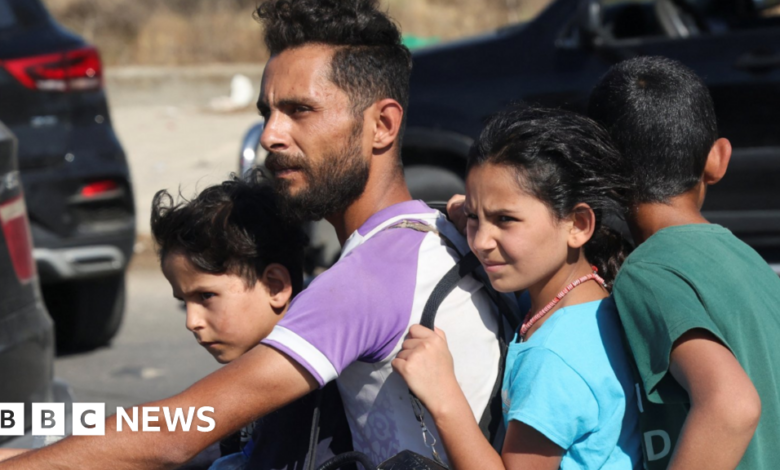
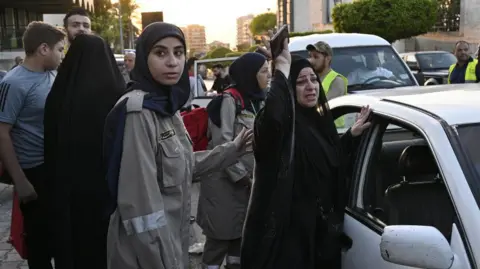 United States Environmental Protection Agency
United States Environmental Protection AgencyAcross southern Lebanon, families rushed to pack their belongings and head north in cars, trucks and motorbikes as the Israeli military struck targets it said were linked to Lebanon’s Shia militant group Hezbollah.
Some residents said they received warnings in the form of text messages and voice recordings from the Israeli military telling them to leave the area near the Iranian-backed group’s location.
Zahra Sawli, a student in the southern town of Nabatieh, told the BBC’s Newshour programme that the bombing was intense.
“I woke up at 6am because of the sound of bombs. By noon, the sound of bombs started to get more intense and I saw a lot of airstrikes in my area.”
“I heard a loud sound of breaking glass.”
Unlike many others, she and her companions did not leave the house – she said they did not dare.
“Where are we supposed to go? A lot of people are still stuck on the streets. A lot of my friends are still stuck in traffic because a lot of people are trying to escape,” she said.
By midday, roads heading north of Beirut were jammed with traffic, with vehicles heading toward the capital on both sides of the six-lane coastal highway.
Other images showed people walking along the beach in the southern city of Tyre as smoke rose from air strikes in the countryside inland.
The BBC interviewed a family of five who arrived in Beirut on a motorbike.
From a village in the south, they were heading to Tripoli in the north. They were exhausted.
“What do you want us to say? We just have to run away,” said the father.
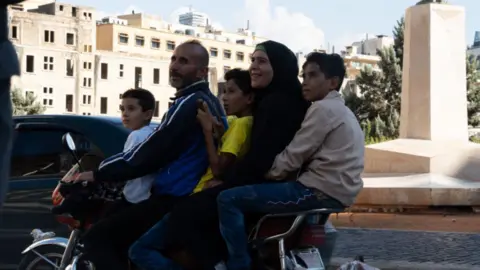 Hassan Harfoush
Hassan HarfoushBy Monday evening, Lebanon’s Health Ministry reported that 356 people had been killed and more than 1,200 injured in the bombing. The ministry said at least 24 children were among the dead. The Israel Defense Forces (IDF) said it had carried out 1,100 airstrikes in the previous 24 hours.
Including an airstrike south of Beirut that the IDF said targeted a senior Hezbollah commander.
There was also widespread anxiety in Beirut. As people from the south arrived in the capital by car with suitcases strapped to the roofs, some residents of the city also left.
Israel has warned residents to evacuate areas where it believes Hezbollah is storing weapons – but it has also sent recorded warnings to residents in districts of Beirut not considered Hezbollah strongholds, including Hamra, an area that is home to many government ministries, banks and universities.
Parents rushed to pick up their children from school after receiving further warnings to leave the area.
A father named Issa took his son out of school and told Reuters news agency: “[We’re here] because of phone calls.
“They called people and threatened people over the phone. So we came here to take my son out of school. The situation is not very good,” he said.
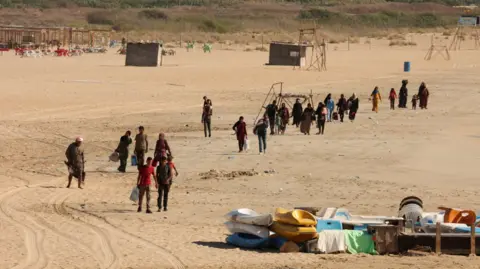 Reuters
ReutersMohammed, a Palestinian man on the road with his wife, spoke to the BBC on his way out of Beirut.
Asked if he would stay in the capital, he replied: “Nowhere in Lebanon is safe, Israel said they would bomb everywhere. Now they threaten this neighborhood, so where should we go?”
“It’s scary, I don’t know what to do – go to work, go home, don’t know what to do.”
Meanwhile, as a BBC crew set up camp on the side of the road, a taxi driver called to ask if they knew about the ongoing fuel crisis. “Too many people are coming to Beirut,” he said.
Schools have been hastily converted into shelters for the influx of evacuees from the south. Under government orders, schools in Beirut and Tripoli as well as eastern Lebanon have been set up as shelters.
The BBC visited a classroom at a public school in Bir Hasan, west of Beirut, on Monday, which was being prepared to receive people from the Bekaa Valley – a Hezbollah stronghold in north-east Lebanon that Israel says is also a target.
Workers said classrooms were filled with mattresses but would be full by the end of the day.
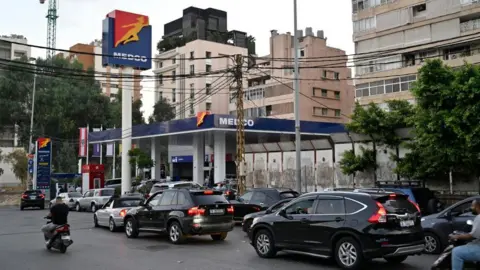 United States Environmental Protection Agency
United States Environmental Protection AgencyMeanwhile, hospitals in Lebanon were also ordered to cancel all elective surgeries on Monday as doctors braced for a wave of casualties and injuries.
Despite the tense and unstable atmosphere in Beirut, some people remain defiant.
“If a full-scale war happens, we, the Lebanese people, should unite regardless of political party, because in the end, our country will be bombed,” one man told the BBC.
Others just accept the violence.
“If they want war, what can we do? They impose it on us. There is nothing we can do,” shopkeeper Mohammed Sibai told Reuters.
Mohammed, 57, who lives in the southern Beirut suburb of Dahieyh – Hezbollah’s main power base in the capital – told the BBC he had “survived every war since 1975” so “it’s normal for me”.
“I’m not leaving, I’m staying in my house,” he said.



